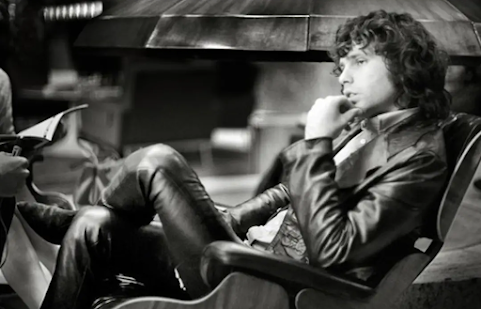THE DOORS' "SOMEDAY SOON": HYPOCRISY, DEATH AND MUSIC
The topic of death emerges repeatedly in the lyrics Jim Morrison wrote
for The Doors, in many guises and contexts.
'Someday Soon' is a prime example of this, as evidenced by the chorus
line, “And I hate to remind you, but you're going to die”.
Morrison most likely wrote this song in 1969, around the same time as
other compositions that, like this one, unfortunately remained unused except
during live performances (as happened, for example, with the magnificent
'Universal Mind').
As far as is known, “Someday Soon” was only played during two shows of
the 'Morrison Hotel' LP tour: in Pittsburgh on 2 May 1970 and in Seattle on 5
June 1970.
We recommend listening to the Seattle version (here’s the link),
which is more convincing than the first in terms of the overall quality of the
performance. It would later be included on the popular 'Essential Rarities' CD,
released in the late 1990s.
The song's lyrics comprise cryptic and impenetrable images that follow
one another like clouds laden with threatening, barely hinted-at meanings.
One example is “Television bleeding like a harvest moon”. Here,
Morrison uses the term 'television' for the third time for social criticism
purposes (the previous two instances are in 'My Eyes Have Seen You' and
'Unknown Soldier').
In 'Someday Soon', the television, shining with a blood-red light like
the full moon used by peasants for night-time harvesting, is a striking
metaphor. It suggests that death will find us in front of the television when
our time comes.
The caustic singer-poet of The Doors wittily exposes and denounces the
personal oblivion experienced by those who lose their authenticity through
conformity and avoid inner introspection and self-reflection.
So, when they face their final moments, the hypocrisy they have relied on
throughout their lives will be useless: "And you're going to be needing
all your lies".
With the help of guitarist Robby Krieger, Morrison's poetic musical
insight is elaborated upon until it glows with a gloomy reverberation, shattering
with bleak sarcasm over a melancholy and sardonic refrain.
The structure of the tune is quite common: verse-chorus-solo - verse-chorus-middle
eight - verse-chorus-solo-middle eight - coda.
This musical framework is excellently conveyed through darkly charming
melodies and instrumental passages that are almost as expressive as the vocals.
The solo parts, entrusted to the electric guitar, are characterized by a
few notes stretched using the technique of bending the strings upwards on the
fretboard.
The result is a high-pitched, sustained sound projected into an ethereal
dimension, reminiscent of relentless flickers cast upon the surface of an
inevitable end.
The drums and electric organ maintain a mainly rhythmic profile,
deploying striking sonic solutions with poetic unpredictability.
These two instruments accompany the voice and guitar, moving forward
together as if in a funeral procession; a bleak and desolate parade crossed by
the lucid madness that can only be inspired by the awareness of an imminent
departure.
Densmore explores unusual percussive angles as the song progresses,
interweaving the intensity of the crash cymbal with the subtle and unexpected
remarks of the snare drum.
Despite the live recording's less-than-perfect audio quality, Morrison's
voice reveals its heartbreaking enchantment. It touches listeners very
effectively, especially during the wonderful coda of the composition.
Here, he reiterates the tune's title with a poignant acceptance of his
fate, symbolizing the approach of death and the uncomfortable questions it
leaves behind, along with futile regrets.
'Someday soon': these
words are spelled out almost desperately in the song's title. For Morrison,
that day came a little over a year after he sang these moving words on the
Seattle stage.
His sudden encounter with death on 3 July 1971 is thus preceded by
'Someday Soon' as a bitter and mournful prediction which soon came true.
Although significant and evocative, the tune was evidently still being
perfected in late spring 1970 and was never recorded in the studio.
The Doors' failure to finish and officially release the song is a
painful loss for rock music, partially compensated for by the two live shows
mentioned at the beginning of this article.
My book "The Doors Through Strange Days"- The most comprehensive journey ever made through The Doors' second LP, is available on Amazon.com, uk, mx, ca, etc.
Here’s the link:




Comments
Post a Comment